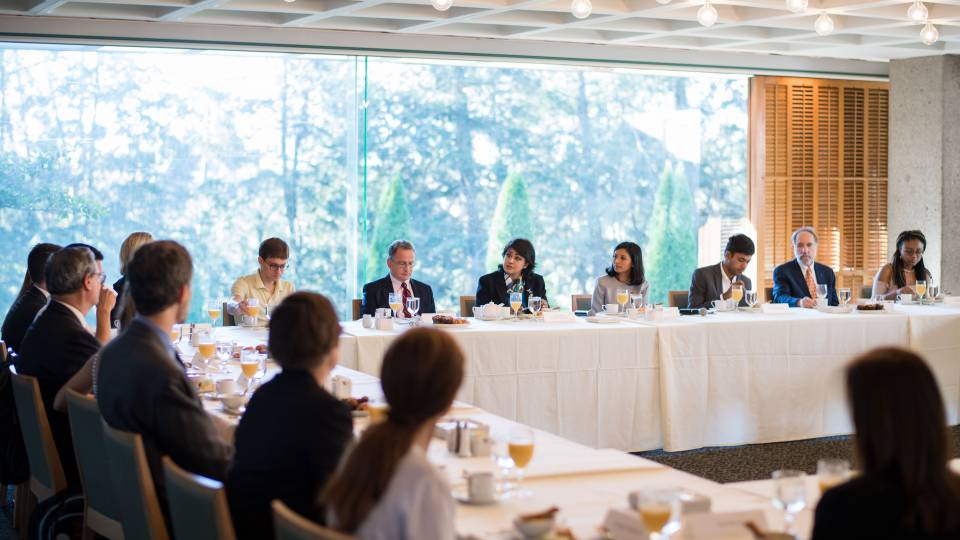Smitha Haneef, Princeton’s assistant vice president for campus dining, and Peter Singer, the Ira W. DeCamp Professor of Bioethics in the University Center for Human Values, enjoy a vegan special in the Garden Room at Prospect House. The dish is a yellow pepper stuffed with wild rice and root vegetables, with sautéed spinach and red pepper sauce.
Each choice we make today about the food we produce and consume can significantly affect the future of the human race. From climate change to poverty and hunger to economics, food is a constant in multiple fields of research. At Princeton, this research is being applied to campus food programs in an effort to identify solutions for some of the global challenges.
Peter Singer, the Ira W. DeCamp Professor of Bioethics in the University Center for Human Values, and Smitha Haneef, assistant vice president of Campus Dining in University Services, met recently to discuss the intersection of food, the environment and innovation.
Singer, a scholar of bioethics and a leading voice of animal rights, has written extensively about the impact of human diets on climate change. Haneef, as co-chair of the Food and Agriculture Initiative and head of Campus Dining, has committed to designing and implementing operational practices that reflect the intellectual work of faculty across all departments.
“What we eat is one of the great ethical issues of our time,” Singer said. “We can eat meals that are heavy in animal products, and thereby contribute to warming the planet and to increasing the suffering of animals in factory farms, or we can eat mostly, or even entirely, food from plants, and thereby minimize our greenhouse gas emissions and avoid complicity in animal suffering. It's our choice.”
Minor shifts like this can have ripple effects at a place like Princeton, which serves more than three million meals a year to a diverse campus community, with a wide range of tastes and preferences.
To that end, Haneef seeks out the perspectives of scholars, practitioners, farmers and other thought leaders in the food industry.
“Professor Singer can help us more fully understand the intersection of food, ethics and climate change,” Haneef said. “He helps us to be bold, to be innovative, in the choices we make each day, both as individuals and as food operators.”

At the Beans, Greens and Grains station in the Butler/Wilson servery, guests choose from a variety of ingredients to create their own plant-based dishes.
Indeed, Campus Dining has implemented several changes over the past couple years that reflect efforts to minimize the negative environmental impact of food on campus.
One example is the Princeton Crafted Burger, a mushroom-and-beef blend that is now the standard on campus. The negative environmental impact of red meat is well documented. According to the Food and Agriculture Organization of the United Nations, cattle represents 65 percent of emissions from the livestock sector. By making the blended burger the standard, Campus Dining has been able to reduce meat served in each burger by 30 percent.
Another example can be found in the dining hall that serves Butler College and Wilson College. In 2016, the culinary team proposed a plant-based sauté station that would offer students a tasty plant-forward option at a focal point of the servery. Now in its third year, the station remains popular among students and continues to expand its offerings.
These shifts towards incorporating more plants into diets mirror global trends.
In his recent article, “With Veganism on the Rise, Is Meat Cooked?” Singer notes declines in meat consumption at country levels while making an impassioned case about the potential impact on climate change.
Each conversation at Princeton opens a door to new ideas. New ideas spark innovative thinking that leads to global solutions.
With food, the world needs them.






